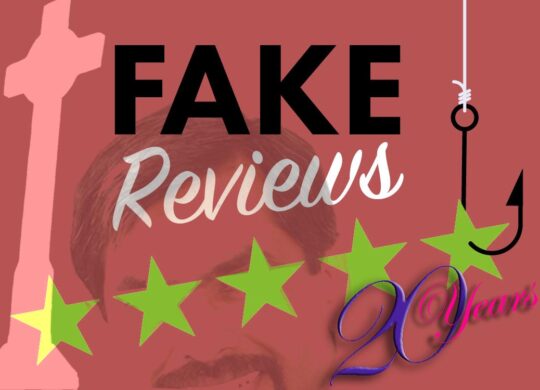False!

Smart shoppers do their research. Mostly by searching online for others’ recommendations. But, says The Washington Post, you can’t trust those. Reason: AI (and paid content creators).
Many ‘best-of lists … are filled with sponsored content, affiliate links and generic ‘reviews’ generated by bots or unqualified writers.”
Added Nilay Patel, editor in chief of the Verge, a technology and culture website:
With the growth of search-engine optimization content farms [i.e., review producers], affiliate mills and influencers who don’t play by the rules, it’s a pretty polluted ecosystem.”
And, to add to our worries, Google and other search engines often prioritize the less reliable lists, probably because these don’t-play-by-rules falsifiers manage to game the system, using techniques to tweak their credibility to result in higher ranks on Google. Unbiased specialty sites whose goal is to inform (rather than sell), including some major players, have been pushed so far down by Google indexing that the average consumer—you and I—no longer finds them.
Gisele Navarro, managing editor of HouseFresh, an air purifier review site, started looking into this when she noticed a rash of sites all recommending the same air purifier:
The recommended model had been recalled, and the manufacturer was the defendant in a class-action lawsuit and had filed for bankruptcy. This company was trying to off-load merchandise by paying websites a huge commission for every sale. And after contacting content writers, I find that 98% of the time, the writer had no expertise in the content, yet they were recommending everything from CBD gummies to home warranties.”
These folks are apparently given templates and lists of specific items to “review” (in the company’s favor, of course), with the help of AI.
So the onus is on us shoppers to get above the random noise to find reliable information. Consumers have to be willing to dig deeper and examine not only the recommendations, but the evaluator.
Lilian Kayizzi, vice president of testing, research and insights at Consumer Reports, recommends these approaches:
Switch search engines (not just Google—because they all use different algorithms for recommendations); scroll down on the results (you might find more reliable ones at the bottom); read the recommendations (formulaic?); look for testing criteria; etc.”
Nope, falsehood should not thrive, especially the kind that is anti-God and anti-the people of God.
And Psalm 12 puts it well. It starts off with the appeal of the psalmist (12:1–2) and ends with an affirmation from him (12:7–8). But in between, first we have the speech of the wicked (12:3–4) …
Do deliver, Yahweh, for the devout one has come to an end,
for the faithful have disappeared from among humans.
Falsehood they speak, one to his fellow;
with the lip of smoothness, in a double heart, they speak.
May Yahweh cut off all lips of smoothness,
the tongue speaking big things—
[those] who have said, “With our tongue we will prevail.
Our lips are in our own [power]—who is lord over us?”
Psalm 12:1–4
… and then the speech of God (12:5–6).
“Because of the devastation of the afflicted,
because of the groaning of the needy,
now I will arise,” says Yahweh;
“I will set in deliverance, the one who pants for it.”
The sayings of Yahweh are clean sayings,
silver refined in a furnace on the earth, distilled seven times.
You, Yahweh, will keep them;
You will preserve him from this generation forever.
The wicked, they walk all around
as vileness is exalted by humans.
Psalm 12:5–8
And the true speech of God always wins over the falsehood of the wicked!
SOURCE: The Washington Post












 Abe Kuruvilla is the Carl E. Bates Professor of Christian Preaching at The Southern Baptist Theological Seminary (Louisville, KY), and a dermatologist in private practice. His passion is to explore, explain, and exemplify preaching.
Abe Kuruvilla is the Carl E. Bates Professor of Christian Preaching at The Southern Baptist Theological Seminary (Louisville, KY), and a dermatologist in private practice. His passion is to explore, explain, and exemplify preaching.